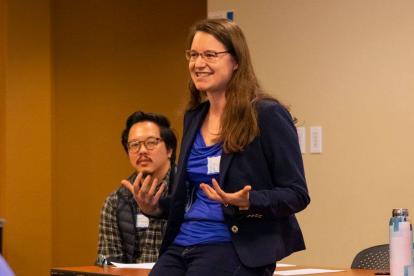When Sinja Küppers began her first semester at Duke as a doctoral student in the Classical Studies program, she noticed that there were not many resources around that supported first generation graduate students. So with the help of a classmate, John Aldrup-McDonald, they created a resource of their own.
Their first step was to apply for a professional development grant and use the funds to host a symposium for first generation graduate students.
“I hoped to raise awareness for first generation graduate students," Küppers says.
A first generation student is the first in their family to earn a bachelor’s or a higher education degree — such as a master’s, PhD, law or medical degree. According to the U.S. Department of Education, about one-third of students enrolled in U.S. postsecondary institutions are first generation students.
Being the first person in a family to earn a graduate degree can pose many challenges. Social and economic factors can impact a student’s academic success. Balancing family dynamics at home with rigorous academics can cause tremendous pressure for first generation students. Networking with influential faculty and pursuing coveted research positions can be daunting. And imposter syndrome can weigh on students. Students may need support outside of what their family can provide in order to complete their programs, plan financially and prepare for the job application process in their fields.

Sinja Küppers, co-founder of Duke F1RSTS...
Küppers says they first envisioned a panel or symposium in a small frame, within their own field, but they ended up expanding it.
Together with UNC’s first generation graduate student group, they organized a successful student symposium event in 2017. It included a panel of first generation graduate students from both universities and became the launching pad for Duke F1RSTS, created in the summer of 2018 by Küppers and Natalie Gasparowicz, also a first generation grad student at Duke who Küppers met while planning the symposium. Gasparowicz was pursuing her PhD in history. Their hope was that Duke F1RSTS would transform over time into a long-term initiative that supported all first generation graduate students at Duke.
“The mission of the student organization is to provide an opportunity for first generation graduate students at Duke to share their experiences," Küppers says.
She served as the first Duke F1RSTS president from 2018 to 2019, and co-organized the group’s initial event for first generation graduate students across all disciplines at Duke.
Küppers’ favorite Duke F1RSTS activities are the annual Duke UNC Symposia and the group's mentorship initiative. The mentorship program is in collaboration with Duke L1FE, a program for low-income, first generation undergrads that is part of the Office of Undergraduate Education. It matches first generation graduate students with first generation undergraduate students at Duke. The pairs meet with each other and share personal stories and experiences about being first generation students at Duke.
Duke F1RSTS also offers professional development events for first gen students on its website and Facebook group page. Other events they've hosted include resume workshops, personal finance and career information sessions, guest lectures, and a recent virtual guided yoga and meditation session to help relieve pandemic stress.
Felicia Lim joined Duke F1RSTS in 2019, one year after it was formed. As a first generation graduate student at Duke, Lim longed for a community of people with whom she could discuss first-generation-specific problems. Lim appreciates the mentorship program that partners with Duke L1FE, too, and wants to carry it forward to others.
“I aim to provide that to many other first gen students here at Duke through this group,” explains Lim, a PhD candidate in molecular cancer biology who is also pursuing a global health doctoral certificate. She is also the outreach coordinator for Duke F1RSTS.

Felicia Lim is a Duke global health...
There are other groups on campus for first generation students at the graduate level including at Duke's School of Medicine, School of Law, Sanford School of Public Policy, and Fuqua School of Business.
The need for support for first generation students isn’t unique to Duke students. Other schools across the country, including the University of Washington, in Seattle, and UCLA, have support programs, too. Similar to Duke, UCLA has a mentorship program where first generation undergrad students are paired with first generation grad students. UCLA also has specific resources for first gen law and medical students.
Lim says that their group is evolving.
“Duke F1RSTS is still a very new group, and we are still adjusting to what our members need and how to address them,” she says, noting that they are hoping to gain more support from more Duke faculty and staff.
“One of our greatest accomplishments is how adaptable we are, and how much grit we have in pushing forward for a better structure” when it comes to leadership, says Lim, adding that Duke F1RSTS is striving every semester to develop events that best meet the needs of the students they serve.
If you or anyone you know is interested in learning more about Duke F1RSTS, please email duke1rsts-request@duke.edu.



